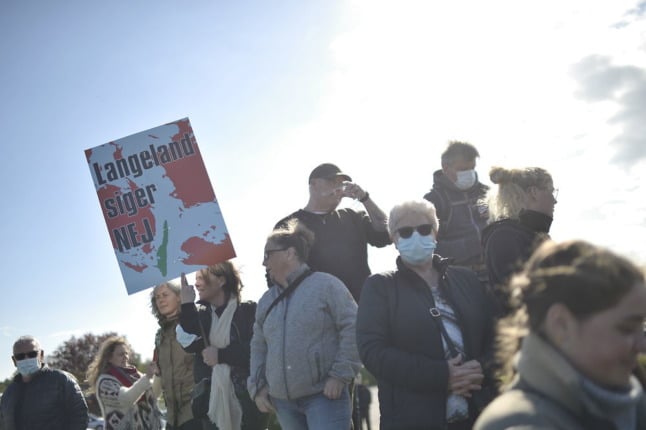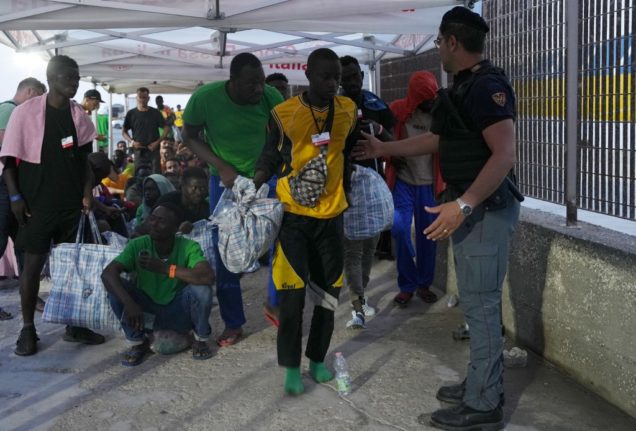The plan to establish a new expulsion centre on the island of Langeland has human rights implications, an expert told The Local, while another researcher suggested that relocating criminal migrants might offer better circumstances for people living in an existing facility.
A proposed new expulsion centre on Langeland will house people with so-called ‘tolerated stay’ (tålt ophold) status, who do not have permission to reside in Denmark but cannot be deported by force. The planned facility will accommodate foreign nationals with criminal records whose sentences include deportation.
The proposed centre was announced by the Ministry of Immigration and Integration on Wednesday.
READ ALSO:
- Denmark announces new expulsion centre for foreigners with deportation sentences
- The middle of nowhere: Inside Denmark’s Kærshovedgård deportation camp
- Denmark rejected asylum seekers hunger strike against ‘intolerable’ circumstances
The plan has been received with opposition from the local community and from other political parties. Experts have commented on possible implications.
“The purpose of the deportation camps (or udrejsecenter) is to make the lives of rejected asylum seekers, criminalised foreign nationals and people on tolerated stay as ‘intolerable’ as possible; to break them down mentally, and to pressure them to leave Denmark,” Annika Lindberg, a sociology researcher at the University of Bern, told The Local via email.
“It is a highly symbolic political strategy, which in practice pushes people into illegality – and at times, to break the law due to conditions of the camps, where people are left in de facto confinement,” added, Lindberg, who has conducted research on the treatment of non-deported migrants in facilities like the one proposed on Langeland.
The establishment of a new expulsion camp in an isolated place like Langeland is likely to worsen the living conditions for people accommodated there, she said.
“The Langeland camp would be built for criminalised foreign nationals and people on tolerated stay. The government has sought to identify a more isolated place, which is likely to impede even further on their freedom of movement – hence, subject them to more confinement-like conditions, more isolation, (more) pressure on people of whom many are already in a vulnerable mental state after spending years in the deportation camps.
“It is likely to contribute further to their criminalisation, stigmatisation, and mental ill-health; but very unlikely to solve any of the underlying issues with the deportation camps,” Lindberg said.
To stop the perpetuation of criminality amongst migrants, the researcher advocated a break with the deportation camp model adopted by successive Danish governments.
“If the government really sought to resolve the situation and break the self-fulfilling prophecy of criminalisation, they should instead look to community-based models that enable the inclusion of rejected asylum-seekers in the labour market, educational system, and local societies,” she said.
Another expert noted the potential effect of the decision on people who live in existing expulsion facilities, which also accommodate foreign nationals who have not committed any crime but who have no legal right to stay in Denmark.
“I assume that moving some residents to Langeland will fulfil the promise of (the Social Democratic government) to remove them from Kærshovedgård, expanding the detention estate by adding another departure centre,” said Katrine Syppli Kohl, who researches the conditions of vulnerable groups and migrant populations at the Danish Center for Social Science Research (VIVE).
“It may be a positive development for the rejected asylum seekers who tend to feel stigmatized by being encamped with people with criminal records,” Kohl added in written comments provided to The Local.
Lindberg noted that “one of the purposes with the camps is to stigmatise and symbolically criminalise residents… This fuels fear among the local population, regardless of whether these people live in Ikast-Brande [municipality, location of the Kærshovedgård facility, ed.] or in Langeland”.
The municipal council on Langeland on Wednesday expressed opposition to the plan, saying that the decision is “completely incomprehensible,” in a written statement to news wire Ritzau.
The council added it “had not been involved at all in a dialogue about the placement of an expulsion centre for deported criminals on Langeland” and that “the government has just arbitrarily decided to place the country’s most hardened and criminal foreigners in the middle of a small community.”
The Socialist People’s Party (Socialistisk Folkeparti, SF), one of the minority government’s parliamentary allies, has expressed its reservations about the planned facility.
“At first glance, we in SF are having a bit of a hard time understanding why (the centre) should be on Langeland,” Carl Valentin, the party’s spokesperson for immigration, told Ritzau.
“Langeland already has problems and survives on tourism. And it is no secret that it is not much fun to have an expulsion centre for people on tolerated stays in your neighbourhood,” Valentin added.
The left-wing party is considering joining conservative parties in formally opposing the proposed centre, according to reports on Thursday. That would leave the government without the required parliamentary majority it needs to push through the plan.
The Liberal party, the largest conservative group in parliament, said it does not want an expulsion centre on Langeland and favours an older plan to build such a facility on an uninhabited island.
Immigration minister Mattias Tesfaye will meet with immigration ministers from other parties to discuss the matter on Tuesday next week, broadcaster TV2 reported on Thursday afternoon.
READ ALSO: Denmark imprisons international student at migrant facility after visa overstay



 Please whitelist us to continue reading.
Please whitelist us to continue reading.
Member comments